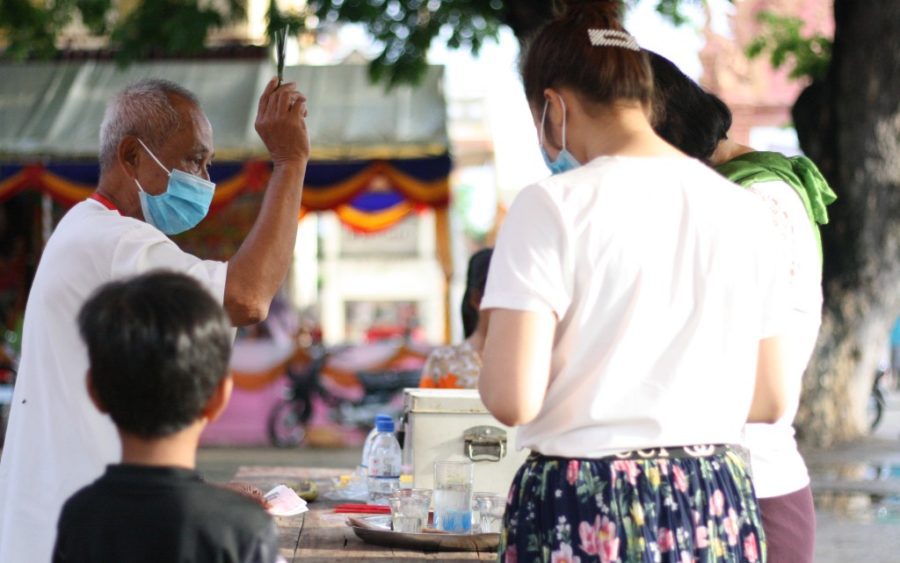Venerable Oun Pol says he has not left his pagoda since the “February 20” Covid-19 outbreak.
“I’m scared of getting infected,” Pol said. “Other monks in the pagoda too. We just stay inside.”
As tens of thousands of Covid-19 cases mount across the country, lives inside Cambodia’s pagodas have become marked by caution and practical concerns — more cooking and fewer ceremonies — while creating a void of Buddhist teachings for the nation, monks said.
Pol, who lives at Kandal province’s Wat Koh Satharam, said the number of monks staying at his pagoda had dwindled from more than 40 before the latest outbreak to just 10.
“Now I do not go ask for food from people anymore. There are many people infected with Covid-19 around the pagoda,” he said.
Nuth Vanny, a monk at Phnom Penh’s Wat Chas, said food had suddenly become a daily concern.
“The most important thing is that there has not been enough food because there have not been many people coming to the pagoda,” Vanny said.
Some monks were getting family members to send rice from their home provinces, he said.
“Some monks still dare to go get the food, for about a half or one hour.… Some desperate monks went to get the food,” Vanny said. “Before, I used to go too, but afterward I became afraid of getting infected with Covid-19.”
Buddhist ceremonies, meanwhile, were largely “suspended,” he said.
Soeung Heng, head monk of the capital’s Thou Dong Chamkar Dong pagoda, said precautions were strict.
His pagoda requires certified Covid-19 tests before conducting any ceremonies, including funerals. They’ve declined invitations to households that haven’t been vaccinated, Heng said.
“We ask them to take samples first, and we can visit them,” he said. “And generally, we cut short all programs and we cannot keep them for two or three days — now it takes one day and night. It’s enough.”
Visitors also must be vaccinated, as well as wearing masks and keeping a distance from the monks, he said.
The precautions extended to food: Monks were not accustomed to cooking their own food, but any foodstuffs they could get now typically needed preparation. And even when the pagoda received cooked food, the monks would reboil them to avoid the risk of Covid-19, Heng said.
All fruit is boiled in salt water, he added.
“It’s not like before, when each table had four or five monks and we ate like a buffet,” Heng said. “[Now] each monk eats separately, and in here it is strict.”
The precaution may have been warranted, with authorities announcing they have found Covid-19 cases at three Phnom Penh pagodas — Toul Tom Poung, Samrong Andet and Prek Liep — on Monday and another, Akrunn Vodey, where six monks were found to be infected, on Tuesday. Cases were previously found in May at Wat Sarawan.
Morth Theara, a 21-year-old university student, said he used to visit Sarawan every religious day, taking with him water and boxes of food.
“I went to the pagoda because I respect Buddhism and the monks who are preserving and practicing religion and culture. I always went by myself,” he said, spending $5-10 for his gifts each time.
“When I can’t go to the pagoda, I feel like not going to study at school,” he said.
Mom Sa Oeun, a monk at Wat Preah Put Khousacha in Phnom Penh, said it’s a difficult time for everyone. “It’s been a struggle,” Sa Oeun said. “Monks are like people too.”
Wat Koh Satharam’s Pol, who has not left the pagoda since February, said he felt it was important that things return to normal and monks get back to work leading teachings on Buddhism.
“It is necessary to have many monks to lead, train and do all kinds of work,” he said. “The monks have knowledge to share with people.”
“If the situation of Covid-19 continues like this forever, then not only me but also other monks can certainly not remain as monks.”













